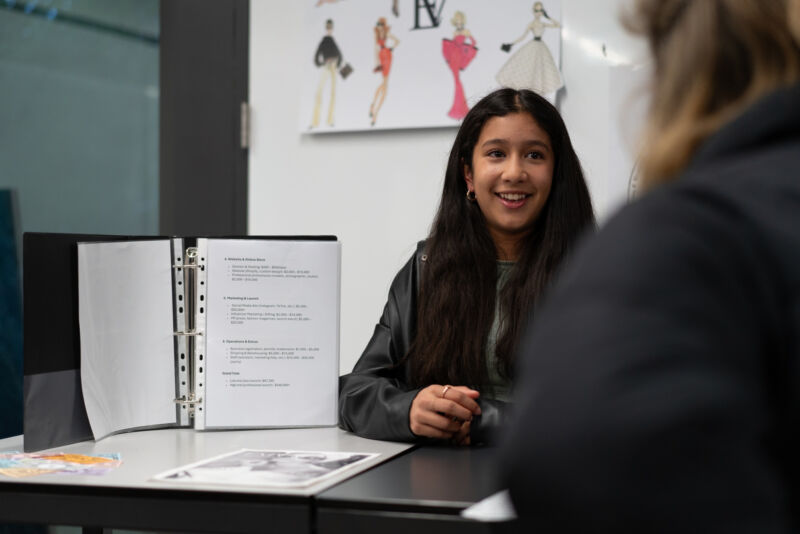
The Neuroscience Says...


Share this article
It is often said that you can spot a Woodleigh student out in the world, and now the field of neuroscience is helping to explain why this may be the case. Neuroscientist and Professor at the University of Southern California, Dr Mary Helen Immordino-Yang, says that ‘wellbeing isn’t separate from academic success, it’s what makes it possible.’
Wellbeing is not an isolated initiative at Woodleigh, it’s an intentional foundation for every student’s learning journey – and with good reason. We’ve always believed that academic excellence is part of a bigger picture. Emotional strength, ethical awareness and a sense of purpose make us better, healthier; they aren’t just nice-to-haves, they’re essential for long-term life satisfaction. Today, we are seeing science measuring and reporting on what Woodleigh educators and families have witnessed for years. That is, when students feel a sense of meaning and connection to their lives and their learning, their brains respond in powerful ways – neural networks become more coordinated, supporting deeper thinking, stronger identity formation and a more meaningful life.
Dr Immordino-Yang has spent years studying the ways emotional engagement affects adolescent brain development. Her research reveals that emotional and intellectual growth are profoundly interconnected and that one cannot thrive without the other. This connection is explained best through the concept of transcendent thinking.
We’re not talking about chanting and burning incense in the bush; this is something else entirely. Transcendent thinking is the sophisticated ability to think beyond the here and now and reflect on broader moral, personal and societal ideas and impacts.
In practice, transcendent thinking involves asking big questions, but with context to know the weight of what they mean. Why do some people have more opportunities than others? Or, What kind of participant in climate change do I want to be? It’s a way of thinking that helps young people make sense of their place in the world, how they choose to live within it and find personal fulfilment.
Transcendent thinking isn’t abstract; it’s measurable and linked to young adult life satisfaction through detailed and long term longitudinal studies. Core to transcendent thinking is what Dr Immordino-Yang describes as autobiographical memory – the personal narrative we build about who we are, or as she describes it, the hat stand; the structure upon which all new learning is hung and organised. The stronger and more affirming the hat stand, the better it supports deep and healthy learning. If students’ learning is connected to their values, experiences and aspirations, their brains build stronger and better-connected pathways – as evidenced in brain scans. Emotional and intellectual growth gain momentum and each new insight deepens their understanding of themselves and the world around them. One Year 10 student wrote about his life, sharing his struggles with feeling unknown in a large family. 'I felt pretty vulnerable writing it,' he said, 'but it felt good to actually tell people.' It was part of a larger project, where this kind of storytelling built upon an affirming narrative, deeper learning and identity formation.
Transcendent thinking emerges when young people see themselves as part of something larger, whether that’s a community, an ecosystem or a shared future. At Woodleigh, this way of learning begins early and is consistent. Our youngest learners explore, inquire and reflect in developmentally appropriate ways. They’re encouraged to apply their learning to broader contexts and to ask not just what, but why and what now? At Minimbah this year, Foundation to Year 2 students, very connected to their school's creek and landscape, investigated their school’s inadequate waste system and its impact. They asked the questions, why and what now? Rather than learning about a system and accepting that it was failing, they pushed further to change theirs. With teacher and community involvement, they removed 67 bins and installed a centralised station. One plastic bag now replaces 67, the kitchen garden’s compost thrives, money has been saved, and the students have actual agency over the systems they rely on.
Wellbeing isn’t separate from academic success, it’s what makes it possible.
Wellbeing is a steady presence at Woodleigh, enabling big thinking to connect learning to life, relationships, resilience and real-world impact. A wobbly hat stand will take you so far, but wellbeing can make a wobbly hat stand sturdy, and a sturdy one stronger. The more it can take on, the better it can support healthy and expansive learning, motivation and a life of meaning. As each student's Woodleigh journey nears its final stages, they can embark on their Year 11 and 12 with skills that help them move through stress, sustain motivation and connect their academic pursuits with their personal and moral values. These are qualities that long outlast rote learning and exam prepping.
So, what makes a Woodleigh student stand out in the world? Dr Immordino-Yang is visiting Woodleigh in November as the keynote speaker at our ReimaginED conference – so we’ll ask her once she’s met a few...
Keep reading
More articles from Woodleigh School


Principal
As students call for change, Victoria’s VCE system, currently under review, faces a pivotal moment.
Continue Reading

Head of Wellbeing and Administration - Middle Years
For adolescents, it’s not a matter of if challenges arise, but when. How we respond makes all the difference.
Continue Reading

Head of Careers, Woodleigh School
Confident, values-driven choices through academic rigour and real-world learning.
Continue Reading